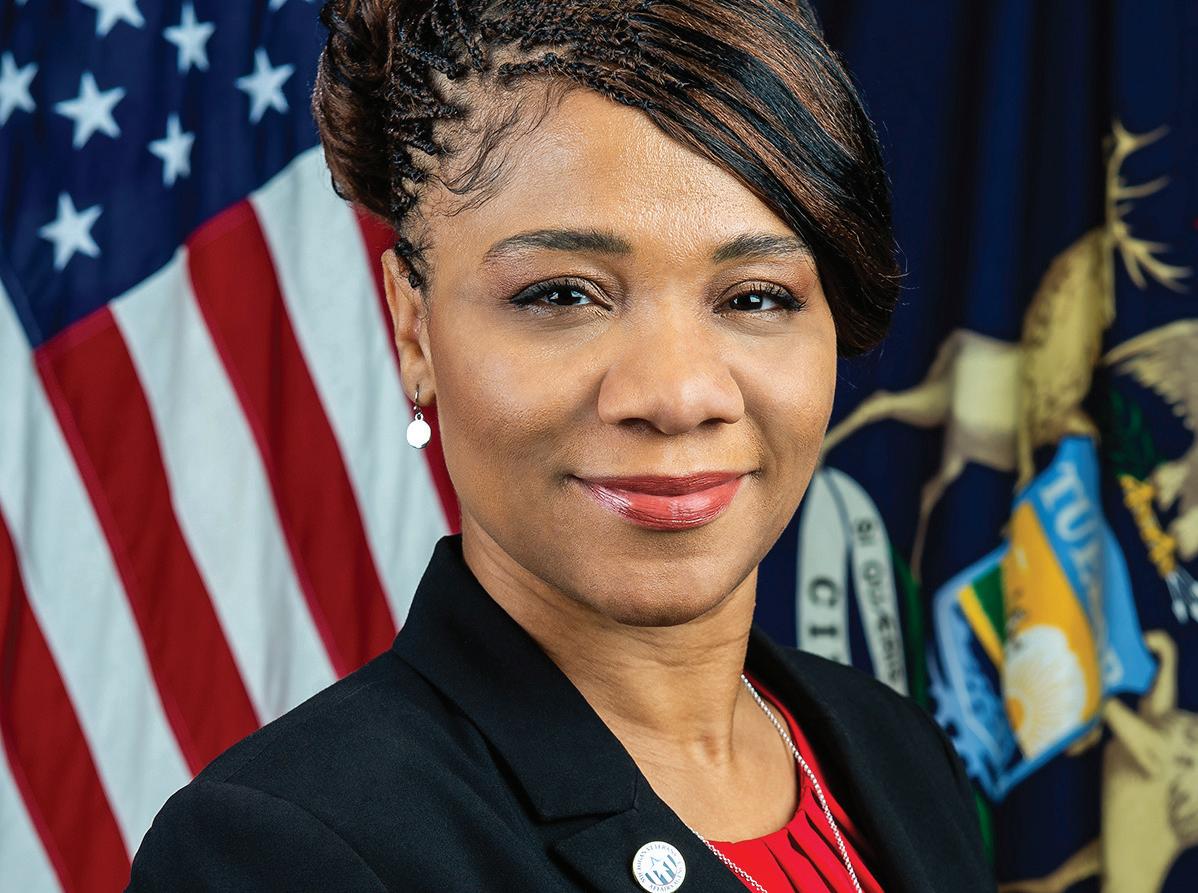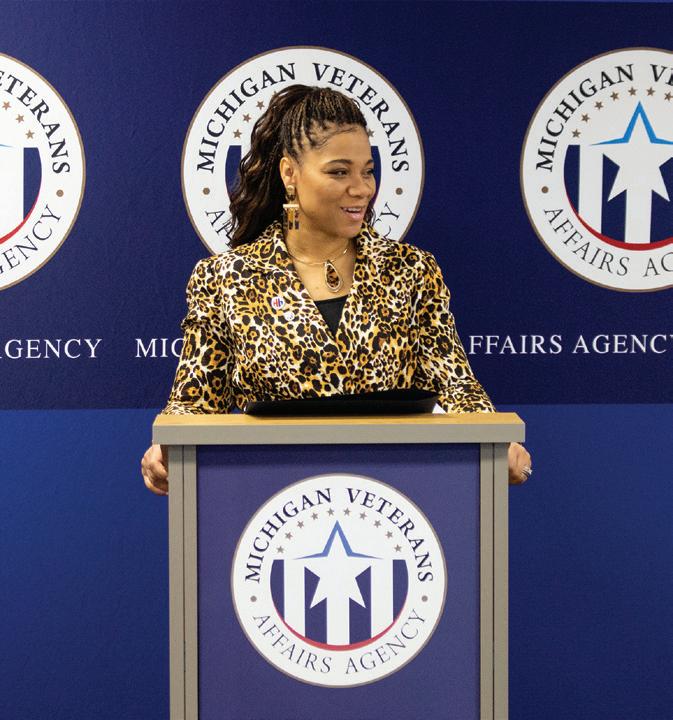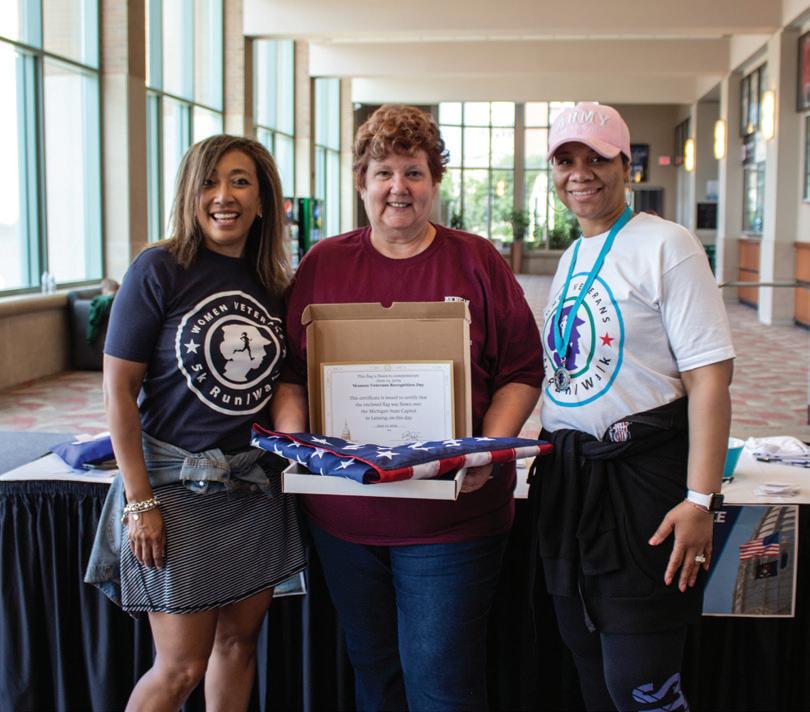
5 minute read
ZANETA ADAMS, DIRECTOR, MICHIGAN VETERANS AFFAIRS AGENCY
A year-long series featuring Detroiters who are driving positive change in their communities. Driving Community Sponsored by Ford Motor Company Fund
Zaneta Adams, Director, Michigan Veteran Affairs Agency
Advertisement
This veteran heads an agency that connects Michigan’s 600,000-plus veterans with crucial benefits and resources.

Michigan Veteran Affairs Agency M Director Zaneta Adams says the wealth of resources available to veterans that they just simply don’t know about is akin to having a $1 million inheritance deposited into your bank account – but never being made aware. The help exists. MVAA’s goal is to first educate Michigan’s more than 600,000 veterans about the employment, education, health care and financial opportunities out there, and then connect them to the sources.
“Our job is to be the statewide coordinating center to connect veterans to state and federal benefits and resources,” Adams says. “One of the main things that I want to make sure that we’re doing is educating veterans on what’s available. Prior to the pandemic, one of my focuses was getting out there in front of veterans, giving them the information and the tools to be successful.” COVID-19 has forced MVAA to adapt their programming, but, she says, “It’s been a blessing in disguise in the sense that we have created some different initiatives to reach veterans, and I think we’re reaching a lot more of them.”
They’ve launched virtual coffee hours to address varied topics from workforce development to LGBTQ initiatives to mental health. Adams reminds that suicide rates among veterans are higher than the general population, and the isolation forced by COVID creates added cause for concern. MVAA’s Check on MIVet (pronounced “my vet”) initiative aims to help remedy that seclusion. Veterans – or the friends and family of veterans – are encouraged to complete a form online to schedule periodic check-ins. Someone from MVAA or one if its partner organizations will call the vet and make sure they’re getting the help and information needed to thrive, and that they “have another human voice on the line that understands what they’re going through.”

In response to the financial burden, the agency has reallocated funds from the County Veteran Service Fund grant (already in place pre-COVID) to offer emergency relief for veterans – assisting with vehicle and home repairs, medical expenses, groceries and other necessities and facilitating education. Notably, MVAA partnered with Meijer to provide grocery vouchers. They’ll also be launching the CORE (Community Outreach Regional Engagement) initiative, which will create a team of players from different but related sectors working together to aid veterans. “So, you’ll have at least 10 to 14 people per region working as a team to meet veterans,” Adams says, adding that they’ll work closely with the Department of Health and Human Services to address mental health, specifically.
Adams enlisted in the Army in 1998, and, while in the Army Reserve, “a space where they say, ‘Oh, you’ll never get called up,’ I got put up for Iraq.” But she never made it to Iraq. While preparing to deploy, Adams fell 10-plus feet from a “deuce and a half” truck and injured her back severely. “I was in a wheelchair. I was told I may never walk again,” she says. “I went through the journey of being disabled, being in severe pain, nerve pain, all the time.”
While trying to manage the pain, depression and suicidal ideations, Adams says, she didn’t know where to turn for resources – or even what was available. After being medically discharged in 2006, it was her own battle to get the help and benefits owed to her that’s fueled her passion to make sure her fellow veterans are better equipped.
“There are so many opportunities out there in many different spheres, whether it be mental health resources, recreational resources, educational resources or employment opportunities, that are out there just for veterans, but they don’t know about them,” Adams says. “And what that tells me is that people want to help. There are people here in Michigan who want to help.”
To the civilian population eager to assist, she says, “Be OK with not necessarily understanding. Be OK with us not necessarily telling our story, but understanding that most people who signed up – especially those who signed up voluntarily, but also those who were drafted – who served their country want to continue to serve in some capacity. So, offering those opportunities where they can continue to serve is a big component.”

HELPING OUR VETERANS
For more information on MVAA’s services, call 800-MICH-VET, visit michiganveterans.com or tune into their radio show Veterans Perspective, hosted by Adams and airing 3-4 p.m. Saturdays on WJR.
Ford joins BLAC in honoring Zaneta Adams and Michigan Veterans Aff airs Agency in their outstanding commitment to their mission to honor and expand support to our veterans. We are inspired by Director Adams’ unwavering initiatives to educate veterans on lesser-known programs and connect them to state and federal benefi ts and resources.
Like Zaneta Adams, Ford Motor Company has been committed to the welfare of veterans for many years. Since 1987, Ford Motor Company has donated over 215 vehicles to the nonprofi t Disabled American Veterans to help transport more than 18 million veterans to their appointments.
In addition, Ford Fund has awarded nearly $1.2 million through the DAV Jesse Brown Memorial Youth Scholarship to young men and women who have generously volunteered their time and distinguished service to help disabled veterans. Ford Salutes Zaneta Adams and MVAA for being a beacon of light for those who have sacrifi ced the most to protect our country.
– Pamela Alexander, director of community development for Ford Motor Company








